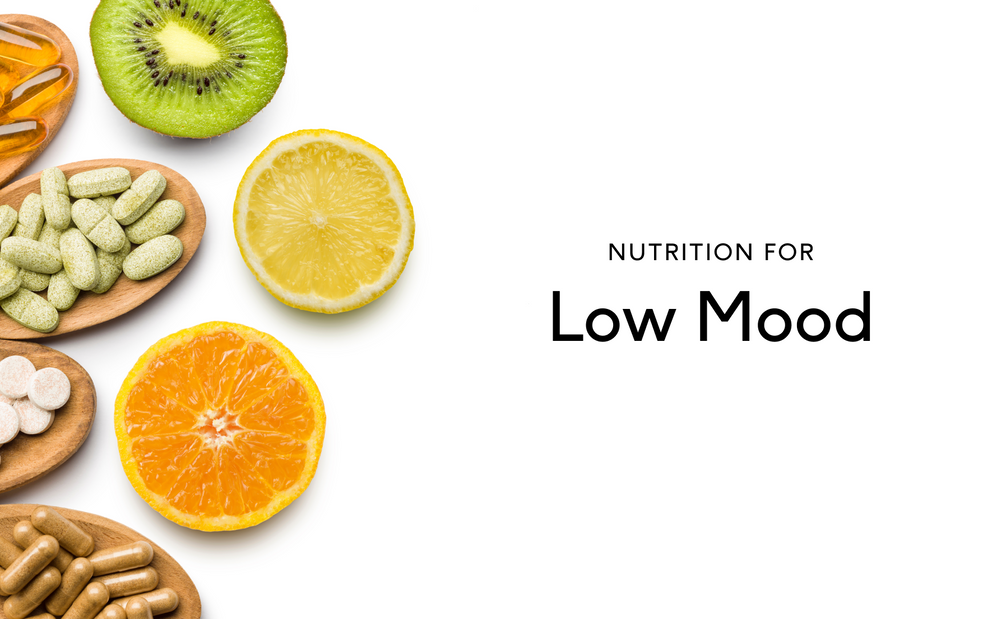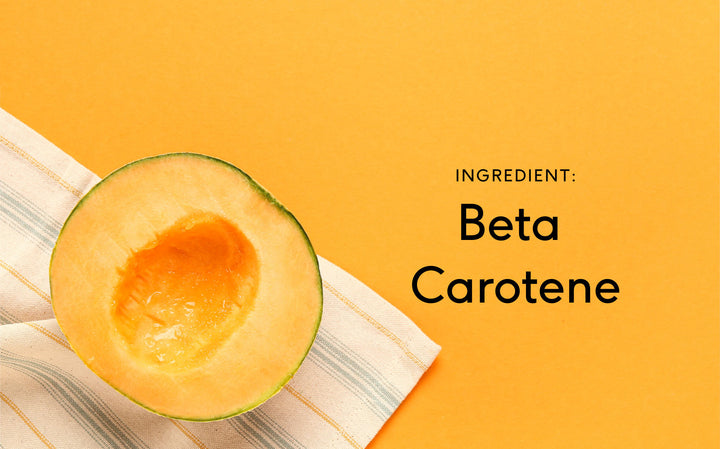Best Vitamins and Minerals for Low Mood [2025 Nutritionist Reviewed]
Sarah is a Clinical Nutritionist who holds a degree in Nutritional Medicine. She focuses on the gut-brain connection and its influence on mental health and brain-based disorders.
Sarah is a Clinical Nutritionist who holds a degree in Nutritional Medicine. She focuses on the gut-brain connection and its influence on mental health and brain-based disorders.
Table of contents

| Symptoms associated with low mood | Sadness, anxiety, anger or lack of self-esteem, depression. |
| What Vitamins can improve mood | B vitamins, Vitamin C and Vitamin D |
| What Minerals can improve mood | Zinc, Magnesium, Calcium |
| What additional ingredients or botanicals can improve mood | 5-HTP, St Johns Wort, Probiotics, Omega-3 (DHA). |
| How long do mood enhancing vitamins and minerals take to work? | It depends on the individual but at least a few weeks. By 3 months you should notice the benefits. |
| Are there any interactions with certain ingredients | 5-HTP should not be taken if someone is taking anti-depressant medication. St Johns Wort also interacts with lots of medications, including anti-depressants. |
1. What causes low mood?
It should be noted that low mood, something that we all experience from time to time, is not the same thing as depression. Low mood may manifest as feelings of sadness, anxiety, anger or lack of self-esteem. Clinical depression, also known as major depression or major depressive disorder, is diagnosed when these feelings have gone on for at least two weeks or more, according to the American National Institute of Health (NIH) and the NHS. Depression is a serious condition which can affect quality of life, and unfortunately it is not uncommon, with an estimated 300 million people around the world experiencing it1.
Low mood and major depression may be triggered by a host of reasons: life events, health issues, genetics, drug or alcohol use, or a poor diet or lack of exercise, according to the charity Mind. Risk of depression is higher amongst older adults, probably due to Alzheimer’s Disease, chronic pain and other health conditions2.
Diet is often overlooked as a factor, but in fact a healthy diet rich in fresh vegetables, fruit, wholegrain cereals and nuts has been found to reduce symptoms of depression, while a diet high in processed, refined and sugary foods may increase the risk1, 3. An increasing amount of evidence-based research has been carried out into specific nutrients required for mental health, as will be discussed below.
2. Can vitamins help improve low mood?
Yes! Vitamins are not only incredibly important for our physical health, but our nervous system and mental health too. They are needed for healthy brain activity including the production of neurotransmitters, and the regulation of hormones and inflammation4. And a healthy brain means a reduced risk of mental health issues like depression4. In fact, parts of the world where healthy, traditional diets are consumed seem to have lower rates of depression. Diets like the Mediterranean Diet are rich in vitamins and other nutrients that protect our mental health. A typical Western diet has a low vitamin content and this may be a contributing factor to the high prevalence of clinical depression in our society.
3. What Vitamins are good for low mood?

Vitamin D
A Dutch study into older adults found that low Vitamin D levels were correlated with an increased risk of depression5. However it was unclear if Vitamin D deficiency caused depression, or the other way around. They found antidepressant medication seemed to increase Vitamin D levels, which could come down to lifestyle changes. People who are not depressed are more likely to spend time outdoors where they are exposed to sunlight and therefore more Vitamin D. Being outdoors could further promote mental wellbeing through greater exposure to light, getting exercise and being in nature, which have all been found to promote a healthy mood.
On the other hand, Vitamin D receptors have been found on the hypothalamus in the brain4, 5, suggesting it plays a role in brain development and neuroendocrine functioning, and therefore has a potential benefit for mental wellbeing and mood regulation. And in fact, some studies have found that Vitamin D supplements can reduce depressive symptoms more than exercise or light therapy alone.
Folate and Vitamin B12
Folate, also known as Folic Acid or Vitamin B9, works together with Vitamin B12, on various functions in the body, including what is called the folate cycle. This important process needs to be functioning properly in order to produce neurotransmitters including serotonin and dopamine, which are the hormones that effect our mood, as well as melatonin, which regulates our sleep4. Deficiency in Vitamin B12 can lead to a functional deficiency in Folate, and deficiency in either may hamper the production of these important hormones4. A systematic review of trials found that supplemental use of Vitamin B12 and Folate over a number of weeks or years reduced the risk of relapse or delayed the onset of depression in those at risk6.
Niacin (Vitamin B3)
Niacin, or Vitamin B3, is not commonly used as a depression treatment, but actually it has been used to treat mood disorders as far back as the 1940’s7. Niacin converts to coenzymes that are important for brain functioning, thanks to their involvement in energy production, antioxidant protection, DNA metabolism and repair, the regulation of inflammation in the brain, and cellular signalling4. Niacin also has the ability to increase cerebral blood flow and it is thought that this is another mechanism which makes it useful in the treatment of depression7.
An interesting case study report describes a psychotherapy patient who had suffered from anxiety and depression for 28 years without responding to antidepressant medications or other treatment options. But after being prescribed a high dose of Niacin, the woman amazingly reported having no feelings of depression, no anxiety attacks, and improved PMT7. A review of trials in the same paper found that Niacin did appear to be beneficial in treating depression and concluded this should be considered as a treatment option going forward.
Pyridoxine (Vitamin B6)
This vitamin is involved in the synthesis of many of our mood regulating neurotransmitters like dopamine, serotonin, and GABA, as well as sleep-promoting melatonin4, 8. Even a mild deficiency has been found to reduce levels of GABA and serotonin, with depression being a common symptom4.
Pyridoxine has been investigated since the 1970’s into its use for treating depression related to pre-menstrual syndrome and the oral contraceptive pill with some positive results. A more recent study aimed to find out if Vitamin B6 is the micronutrient most effective in combatting depression and anxiety8. A group of young people with anxiety and/or depression were given Vitamin B6, Vitamin B12 or a placebo. The B12 group had a minor improvement compared to placebo, but the B6 group showed a significant improvement in both anxiety and depression, according to a mood questionnaire.
Vitamin B Complex
B Vitamins work synergistically together, and in fact all of the B Vitamins play a role in brain functioning and a healthy mind4.
One study that backs this up looked at people who regularly consumed yeast spreads like marmite. They found regular consumers had lower stress and anxiety levels than non-consumers, and it was concluded that this was thanks to the high levels of B Vitamins found in these spreads9.
Taking a B Complex supplement rather than individual B Vitamins is recommended to get a full range of B Vitamins in a balanced form, or you could take them as part of a multivitamin, which has also been shown to benefit brain health4.
Vitamin C
We associate Vitamin C with a healthy immune system, and deficiency with the disease scurvy. But there is a link to mental health too. In fact, back in the 1750’s, Scottish physician, James Lind, described one of the symptoms of scurvy as the “melancholy and despondency of mind”10. Thanks to modern science we now understand the link between Vitamin C and mental wellbeing. The vitamin is a cofactor for the conversion of tryptophan to 5-HTP for serotonin production, and of dopamine to nor-epinephrine which plays a role in the regulation of mood11.
Unfortunately, Vitamin C deficiency is more common than you may think. A survey found 25% of men and 16% of women in low-income groups in the UK were found to have deficient Vitamin C levels12. And people who are depressed are more likely to be deficient. A review of trials found that there was a link between adverse mood and Vitamin C deficiency10. And when depressed psychiatry patients in India were tested at random, it was found they had lower Vitamin C levels than healthy controls, and it was suggested Vitamin C supplementation could be beneficial11.
4. Can minerals help improve low mood?
Yes, exactly like vitamins, a healthy diet provides us with the essential minerals our bodies need to maintain both our physical and mental health. We can obtain these minerals through food sources like wholegrains, nuts and seeds, and green leafy vegetables, or we can take a supplement, if required.
5. What minerals are good for low mood?
Zinc
Zinc has an anti-inflammatory effect, and since brain inflammation is involved in depression, this suggests zinc could be beneficial13. Furthermore, zinc dysregulation in the brain is thought to be connected to the development of depression14.
A meta-analysis of trials found that supplementing with Zinc was beneficial in treating depressed patients14. The highest dose of Zinc was found to be associated with a 28% reduction in depression.
Magnesium
Low levels of Magnesium have been associated with higher rates of depression15. And unfortunately low levels of Magnesium are common in the West due to a lack of green leafy vegetables and wholegrain cereals, and high levels of processed food16.
There are various reasons Magnesium may protect from depression. It can aid in lowering CRP and Interleukin-6: inflammatory markers associated with depression15. Magnesium is also involved in hormones that regulate the HPA axis. Dysregulation of the HPA axis changes hormones like cortisol that increase our stress levels and have been associated with depressive symptoms15.
A trial giving depressed patients 500mg of Magnesium Oxide daily for 8 weeks found that the symptoms of depression improved when compared to a placebo group17.
Calcium
A connection has been found between low levels of Calcium in the diet and an increased risk of depression18. Calcium is an important mineral, acting as cofactor for many enzymes in the body and is involved in cognitive functioning18. Pregnant women who had low levels of Calcium were found to be more likely to be depressed than those who had high intake of Calcium19. And women suffering from PMS symptoms including depression and anxiety, had lower levels of Calcium than other women20. The PMS was alleviated when the women were supplemented with 1000mg Calcium Carbonate every day for 3 months20.
6. What additional nutrients can help with mood?

Omega 3
Like vitamins and minerals, omega-3 is considered an essential nutrient, meaning your body can’t make it and you need to obtain it through the diet. It’s also really important for mood regulation. This is partly thanks to its role in regulating inflammation in the body, including the brain21. It also appears to cross the brain membrane and influence molecules that regulate our mood, suggesting that it may support mental wellbeing in other ways too22.
EPA and DHA are the active forms of Omega-3 fatty acids and the most common food source of these is oily fish. And depression has been found to be less common in parts of the world where high amounts of fish are consumed22.
Studies have found that supplementing with EPA and DHA Omega-3 fatty acids helped people with mood disorders and other mental health conditions22. Three portions of oily fish per week, such as salmon, mackerel, or sardines, would give you the equivalent EPA and DHA intake of 1g per day, an amount used in many trials22. For those who don’t regularly eat fish, dietary supplements are advised as an alternative, either a good quality fish oil, or a vegan equivalent like Feel’s Vegan Omega-3 from sustainable algae.
5-HTP
5-HTP is the precursor to serotonin, our “happy hormone”, and is made by the body by the amino acid, tryptophan. You could support your body’s production of 5-HTP by ensuring you have enough protein in your diet. But taking 5-HTP as a dietary supplement can result in an anti-depressant effect since it bypasses the enzyme that converts tryptophan to serotonin23. Fluoxetine is an antidepressant medication which also works to enhance levels of serotonin. An Indian study comparing the efficacy 5-HTP and Fluoxetine in patients with depression, found that both groups had a similar rate of success23.
St John’s Wort
St John’s Wort has been traditionally used to treat mood disorders for thousands of years and is one of the most popular natural remedies for depression. It has a number of active compounds that are thought to act as an antidepressant, hyperforin is considered the main one. It has been found to increase concentrations of various neurotransmitters including serotonin, dopamine and GABA, at least to the same level of antidepressant medications, if not more24. A systematic review of trials found significant positive results of the use of the herb in cases of mild to moderate depression, when compared to placebo, comparable to the results of antidepressant drugs25. There were a lack of trials investigating severe depression.
Please note that St John’s Wort can interact with a number of medications, so please consult your healthcare provider before taking it.
Probiotics
When we consider that 95% of the body’s serotonin “happy hormone” is produced in the gut26, this helps us to understand that a healthy gut is another key ingredient for a healthy mind. A healthy, fibre rich diet can promote a healthy gut, but if you need a helping hand, a probiotic supplement, like Feel’s Daily Biotic can help. Studies back this up. A trial giving a probiotic to patients with major depressive disorder alongside antidepressant medication improved their cognitive function when compared to the placebo group27. A recent meta-analysis supported the use of probiotic supplements and detailed it as a promising approach in improving the treatment of depression. in treating anxiety and depression, although they concluded that more research was needed 28.
7. When is best to take vitamins and minerals for enhancing mood?
Ideally we want to have a healthy diet, rich in fresh vegetables and fruits, wholegrains and nuts, as often as possible. This helps to ensure we are getting the best vitamins, minerals and other nutrients for our physical and mental health, and is a better approach than waiting until you feel your mood is low before making dietary or lifestyle changes.
If you are unable to get the nutrients you need from your diet, you may like to consider a good quality multi-nutrient supplement, like Feel’s Multivitamin. It’s been designed for long-term use so you can take it daily, again without waiting until you feel your mood is low. Multivitamins are best taken with food to enhance absorption, preferably earlier in the day since some vitamins promote energy which could disrupt your sleep.
8. When is best to take additional ingredients for enhancing mood?
As with vitamins and minerals, you should ensure your levels of omega-3 fatty acids are adequate all of the time. If you want to achieve this through food sources, aim for 3 portions of oily fish per week (e.g. salmon, sardines, mackerel). If you prefer to take a supplement, such as a fish oil or Feel’s Vegan Omega 3, take this daily, with food, on an ongoing basis.
You can aim to keep your gut healthy through a high fibre diet, but a probiotic supplement could be helpful in times of need, or on an ongoing basis, if required. Feel’s Daily Biotic is designed to be taken every day, with food.
Additional ingredients like 5-HTP and St John’s Wort that have an anti-depressant effect could be taken if you feel your mood is low. Just remember to discuss with a health professional if you have been diagnosed with clinical depression or are using any other depression treatments.
9. How much of vitamins and minerals do I have to take to improve mood?
It’s generally now recognised that the reference intakes of vitamins and minerals have been set too low and we actually need considerably more. If you take a good quality multivitamin like Feel’s, along with 1 gram daily of EPA and DHA omega-3 fatty acids, you’ll be getting good levels of nutrients for general physical and mental wellbeing.
Some studies have used very high doses of nutrients as depression treatments, it’s best to do this under the guidance of a nutrition consultant or healthcare professional.
10. How long does it take for the ingredients to work for improving mood?
Studies have varied in length from just a few weeks to more longer term. The best thing is to try to keep up a nutrient dense diet all of the time, to maintain a healthy mood on an ongoing basis.
11. Possible side-effects of taking supplements for improving mood?

Some vitamins and minerals can cause toxicity in very large doses, but generally the natural supplements discussed here are considered safe with low levels of side-effects, and in fact it is this that has made them popular as alternatives to antidepressant medications. However caution should still be taken if you are on medication, as noted below.
12. Are there any interactions or contraindications with ingredients for low mood?
Serotonin Syndrome can occur when serotonin levels in the brain get too high. This rare but serious condition could happen if you take antidepressant medications alongside natural supplements that work on increasing serotonin levels. St John’s Wort requires particular caution because it interacts with a great number of medications, not only antidepressants, reducing their efficacy. If in doubt discuss with your healthcare provider.
References
- https://nutrition.bmj.com/content/4/2/e000332
- https://www.ncbi.nlm.nih.gov/books/NBK430847/
- https://bmcmedicine.biomedcentral.com/articles/10.1186/s12916-017-0791-y
- https://www.ncbi.nlm.nih.gov/pmc/articles/PMC4772032/
- https://pubmed.ncbi.nlm.nih.gov/18458202/
- https://pubmed.ncbi.nlm.nih.gov/25644193/
- https://www.researchgate.net/publication/287922529_Vitamin_B3_for_depression_Case_report_and_review_of_the_literature
- https://www.ncbi.nlm.nih.gov/pmc/articles/PMC9787829/
- https://www.sciencedirect.com/science/article/abs/pii/S1756464617307077
- https://bmcpsychiatry.biomedcentral.com/articles/10.1186/s12888-020-02730-w
- http://www.galaxyjeevandhara.com/index.php/ijss/article/download/262/248
- https://academic.oup.com/jpubhealth/article/30/4/456/1512595
- https://pubmed.ncbi.nlm.nih.gov/20156515/
- https://www.sciencedirect.com/science/article/pii/S0163834320301146
- https://www.sciencedirect.com/science/article/pii/S0165032718321050
- https://www.sciencedirect.com/science/article/pii/S0022316622161389?via%3Dihub
- https://www.sciencedirect.com/science/article/pii/S089990071630244.
- https://www.frontiersin.org/articles/10.3389/fnut.2023.1042522/full
- https://www.ncbi.nlm.nih.gov/pmc/articles/PMC2933451/
- https://pubmed.ncbi.nlm.nih.gov/19574172/
- https://www.ncbi.nlm.nih.gov/pmc/articles/PMC6658985/
- https://www.health.harvard.edu/blog/omega-3-fatty-acids-for-mood-disorders-2018080314414
- https://www.sciencedirect.com/science/article/abs/pii/S1876201812001177
- https://pubmed.ncbi.nlm.nih.gov/25988866/
- https://pubmed.ncbi.nlm.nih.gov/27589952/
- https://pubmed.ncbi.nlm.nih.gov/28035530/
- https://pubmed.ncbi.nlm.nih.gov/30388595/
- https://rsdjournal.org/index.php/rsd/article/view/18359




















































 Back
Back





